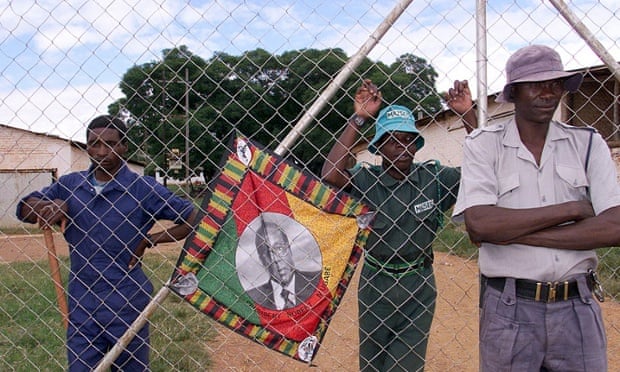
Zimbabwe is the successor state to the formerly white minority governed Rhodesia. In 1979 the Lancaster House Accords led to the demise of the white minority regime and one of the leaders of the black revolutionary movement there, Robert Mugabe, took over. In the late 1990's and early 2000's, the Mugabe regime began what can only be called a terror campaign to drive white farmers out of the country and redistribute their property to the regime's political supporters. Disregarding the property rights, and in many instances the right to life, of white farmers, their families, and black workers who earned their livings on those farms, the Mugabe regime was brutally effective in its efforts.
Now, the same tactics are being revved up again by the Mugabe regime (yes, he's still in power at a frisky 92 years young). This time, though, the targets are black Zimbabwean's who object to his regime's policies. With the failure of the regime's "Look East" program of economic collaboration with China, political opposition to Mugabe within the ranks of his political party has grown. Mugabe and his supporters have been expelling party members who have dissented from his regime. As these dissenters now join the opposition, they are finding that their large farms -- which they received from the regime after it had driven out the previous white owners -- are in danger of being seized by violence. As The New York Times quotes one of the dissenters, the possessor of farm stripped from its previous owner under Mugabe's earlier "land reform":
"When it was happening to the whites, we thought we were redressing colonial wrongs," said Mr. Mutambara, 64, who got his farm after it had been seized from a white farmer. "But now we realize it is also coming back to us. It's also haunting us."Yeah, funny how things happen like that.
Land reform in Zimbabwe was a good idea in principle -- but the way it was carried out, as a tool to oppress the white minority population -- ended up destabilizing not only the economy of that country but security of land ownership itself. Of course, the was always in no small part the ultimate goal of the regime, to erode property rights so land and its possession could be used as a tool to ensure obedience from the populace lucky enough to be in on the gravy train to get the redistributed farmland. Again, as the Times reports:
“No one is safe,” said Temba Mliswa, 44, who was the chairman of the party’s chapter in Mashonaland West Province before his expulsion from the party in 2014.
Mr. Mliswa got a 2,000-acre farm belonging to a white Zimbabwean in 2005. When he took possession, Mr. Mliswa said, police officers beat the white farmer and his workers.
But last year, Mr. Mliswa said, hundreds of youths sent by the party invaded the farm again, destroying property and beating his workers. They eventually left, but one of Mr. Mugabe’s ministers recently held a rally in which he threatened to take Mr. Mliswa’s farm unless he stopped criticizing the president’s party.Sow the wind, reap the whirlwind.
“They use the land to control you,” Mr. Mliswa said.
Property rights, like the rights to life and liberty, are natural rights, but like every right they are also the product of an intricate interplay between history and culture. They are, as a result, fragile things, the result not of political rhetoric and party platforms but the painstaking work of centuries of legal precedent, custom, tradition, social convention and limited government. Once those rights are shredded -- to oppress the disfavored, pay off lackeys or some combination of the two -- it is very difficult to restore them down the road.
A last quote from Mr. Mliswa highlights part of the problem that besets Zimbabwe:
“There was blood spilt on my farm, there was violence, which I really, really, really, really regret,” he said of the seizure of his farm from its white owner in 2005. “I apologize profusely, but it was because of the system I was involved in. I belonged to a party whose culture is violence.”But parties and cultures are made up of people, including people who benefit from stripping rights from others. A disrespect for property rights is accompanied, inevitably, by the threat and eventual implementation of violence, which is one reason why revolutions usually end up devouring their own. In this, Zimbabwe serves as a cautionary tale.
3 comments:
The poison of legal realism. Teaching people that power and rights are merely "what you can get away with" dares them to try their hand at it. The rule of law, natural law, and the divine right of kings might be cynically labeled systems of control, but they also bind those in power.
We've lurched Zimbabwe-ward in recent years. Danger, Will Robinson.
Exactly. What besets Zimbabwe isn't unique to that country or its people.
So committing murder = shredding the social fabric. Yes, I guess if everyone's dead then it is tough to be socializing with them.
Post a Comment